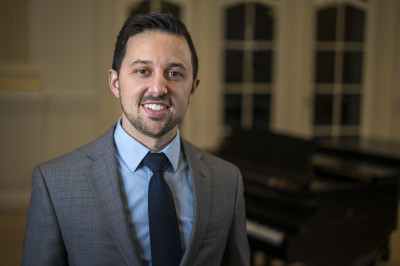The Master of Music in Music Education, Composition Specialization is intended as a professional degree with specialized training towards composing music for educational ensembles and incorporating composition, improvisation, and music theory into K-12 music classrooms. Students enrolled in the program will produce original compositions for educational ensembles and have them performed publicly by student ensembles.
The degree option in music education with a specialization is composition is designed to provide music educators with the ability to apply compositional and arranging skills and the pedagogy of the creative process to the classroom in K-12 settings. This provides an option for a master’s degree in music education for students with an interest in composition, arranging, and the pedagogy of the creative process as opposed to the more traditional CSU graduate music education offerings of conducting, Kodály, instrumental, and choral.
Students take advanced coursework in scoring and arranging for educational ensembles, curriculum development for composition in K-12 classrooms, music theory and history, and applied composition lessons. Students in the program will have multiple opportunities to have their works performed and recorded by local student ensembles.
This hybrid program is open to students with bachelor’s degrees in either music education or composition and equips students to pursue a career in the field of educational composition.
Upon completion of the program, our students aspire to:
- Develop the skill, intellect, and musicianship necessary among those who wish to become the next generation of leaders in the field of Music Education.
- Compose original works for educational ensembles at the elementary and secondary school levels. Such ensembles include (but are not limited to) the following: choral ensembles, wind ensemble or concert band, string orchestra, full orchestra, jazz ensembles, and chamber ensembles.
- Arrange preexisting works from the standard repertoire for educational ensembles at the elementary and secondary school levels.
- Design and develop curricular goals for music composition, improvisation, score analysis, and aural skills.
- Develop and implement pedagogical strategies for incorporating music composition and related creative skills into the elementary and secondary school music classroom.
- Develop the ability to think abstractly, analyze complex ideas or phenomena, synthesize or generalize knowledge across disciplines and sub-disciplines, interpret and apply scholarly findings to specialized topic areas, and communicate ideas effectively in both oral and written forms.
- Develop an awareness of substantive publications in the field of music education and the field of education as a whole.
- Define national trends in music education that impact K-12 educational settings.
- Describe the contemporary role that curriculum and assessment design plays in the teaching-learning process.
- Create music curriculumassessment tools designed to measure both simple and complex learning in both classroom and studio/applied settings.
- Engage in informed critical discussion regarding current standards-based frameworks in music and in contemporary K-12 American education contexts.
Why Music Education and Composition?
The collaborations between composers and music educators have been a cornerstone of American music life since the country’s inception. Every year, thousands of original compositions are created expressly for K-12 music students, and countless professional composers have created substantial careers writing for this market. However, many students who have completed degrees in music composition have little training in writing for younger musicians or the types of ensembles found in American schools.
Similarly, many music education programs lack training in composition skills, despite composition being an important national standard for music education. This degree program is designed to help composers and educators better utilize composition and related skills in the classroom. Students completing the degree will be able to both create original works for the classroom and utilize composition as a teaching resource in K-12 music settings.
Who Should Apply?
This degree is primarily intended for two types of applicants:
- students who hold an undergraduate degree in music composition and wish to compose for educational ensembles, or
- students who hold an undergraduate degree in music education who wish to better utilize composition and related skills in the classroom.
Students who hold other music degrees will also be considered, assuming all other qualifications are met including the submission of a composition portfolio and prior teaching experience.
Admissions Process
In addition to the admissions processes for the Graduate School and the School of Music, Theatre, and Dance, applicants will submit a portfolio of three original compositions with recordings, at least one of which is composed for an educational ensemble (choral, orchestral, or wind band work at an appropriate difficulty for secondary schools). Select applicants will complete an on-campus or video interview with the composition and music education faculty.




